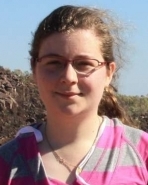People of ACM European Chapters - Anne-Cécile Orgerie
May 14, 2019
Can you briefly describe your own line of research and how you became interested in this area?
My research targets the energy efficiency of computing and networking systems. It is about questioning our habits, as computer scientists, to make systems, processes and infrastructures smarter and more connected. To do so, we often rely heavily on energy-hungry computers, data storage, and networking devices that are not power-proportional: their power consumption stays high, even when they are lightly used.
I entered this field during my Master’s thesis on the energy efficiency of grid computing infrastructures. Computing and networking infrastructures often seem to be ”virtual,” and this ethereal vision hides their concrete impact on electricity consumption and physical resource usage. Through power measurements on real infrastructures, I started to understand how they consume energy, and to identify some sources of waste. My main focus is currently on cloud computing infrastructures and smart grids. Finding ways to make these infrastructures more sustainable is both an electrifying challenge and an urgent requirement.
In your area of research, what recent advance/emerging subfield will yield important advances in the years ahead?
Distributed systems cope with an unprecedented increase in the number of connected things and users, and of big data to manage in a privacy-preserving and efficient way. As self-feeding systems, the more power they get, the more their users require it: we expect high bandwidth, low latency, high availability, high security, high reliability and low cost.
Finding tradeoffs between these user constraints and their energy cost is currently investigated through the design of more distributed cloud computing infrastructures. Fog and edge computing tend to make computing resources closer to the users, thus reducing data movement. Yet, to improve the energy efficiency of these infrastructures, the number of employed devices needs to decrease and their lifetime to increase. In this quest for the optimal computing infrastructure, we hope to reach power-proportionality at some point.
Exploiting renewable energy sources is also considered to achieve higher sustainability. Distributed infrastructures are necessary to adapt to the constraints of these sources in terms of variable and often intermittent production. The next steps consist of exploring the life cycle of computing systems, and proposing eco-designed and environmentally-friendly devices and software.
Will you tell us a little about the ACM SIGOPS France Chapter?
The chapter is named ASF (for Association SIGOPS France) and counts around 170 members. Its main goal consists of actively participating in the animation of the French scientific community around computer systems in the broad sense. To this end, we work in close collaboration with the French research group on distributed systems and networks (GDR RSD). Together, we organize an annual winter school (in English) on distributed systems and networks that gathers almost 60 participants, mostly PhD students.
For the past two years, we have also launched a joint thesis award to encourage and promote research in distributed systems and networks, and more specifically to reward outstanding doctoral work on these subjects. Finally, we organize a workshop at the annual French conference on parallelism, architecture and computing systems (Compas). This workshop is open to the young (and not-so-young) permanent members of the community, and aims at fostering collaboration among the participants.
What advice would you offer a younger colleague just starting out in the computing field?
Computing is a broad area, rapidly moving and expanding over many other fields. It provides a steady stream of thrilling and diverse challenges. Finding a motivating one that suits your tastes and desires will help you to delve deeper into your ideas, despite the difficulties.
Computing is a field of interactions: it requires people to talk to each other. Most of the time, people working in computing are themselves part of the documentation of the software or system they work on. They each have part of the knowledge required to understand how it works, how it can evolve and how one can contribute to it. Speaking with many and diverse people will help you to develop your skills, in order to propose ingenious solutions and to explore uncharted tracks.
Speaking with colleagues is also essential for day-to-day work, to question our practices and processes, to share viewpoints and advice. Choosing the right mentors is crucial, especially for women, since there are too few of us in the computing field. Mentors can help you to take a step back, work on skills you need to improve, and envision your future. (I certainly appreciate the mentors I have had!)

Anne-Cécile Orgerie is a permanent research scientist at the Centre National de le Recherche (CNRS) in Rennes, France. Her research interests include energy efficiency, cloud computing, green computing and networking, large-scale distributed systems, and high-speed networks.
Her service activities include co-chairing the Architecture and Networking track for the IEEE/ACM International Symposium in Cluster, Cloud, and Grid Computing (CCGrid 2019) and serving as a program committee member for SC18 and SC17. Orgerie is Vice Chair of the French Chapter of the ACM Special Interest Group on Operating Systems (ACM SIGOPS France).